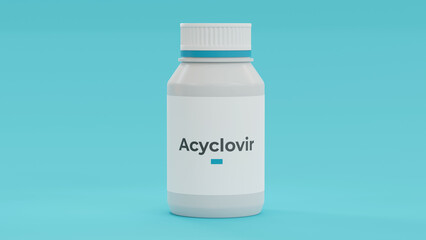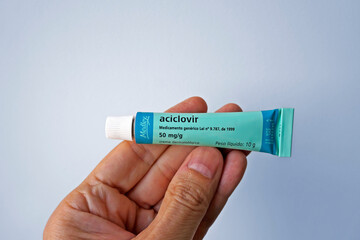Acyclovir is accessible in the form of capsules, suspension and buccal tablets. Acyclovir tablets are only available as a generic medication. Acyclovir cream and ointment are also available that should be applied externally on the skin. Acyclovir IV (intravenous) drug is also available that is administered by healthcare professionals only.
Acyclovir Highlights

- Acyclovir belongs to the antiviral class of drugs and is used as an antiviral therapy to treat certain viral infections.
- Acyclovir is a prescription-only drug that can be bought only if you have a prescription.
- Acyclovir treatment is used against viral infections including genital herpes (sexually transmitted disease), varicella zoster (chickenpox) and herpes zoster (shingles).
- Acyclovir can be used as a part of a combination therapy with other medications.
- Acyclovir does not cure herpes infections as the virus still stays inside the sufferer’s body after taking the medicine and may become active in future.
How Acyclovir Works Against Herpes Infections
Acyclovir medication works by diminishing the ability of the herpes virus to replicate and make copies inside the body of the sufferers. It does not kill the virus but treats the symptoms and eases infection-related discomfort. Herpes infections include genital herpes, shingles, cold sores and chickenpox. The virus may get activated in future and cause symptoms.
Different forms and strengths of Acyclovir Medication
- Acyclovir tablets (400 mg and 800 mg)
- Acyclovir capsule (200 mg)
- Acyclovir oral suspension (200 mg/5mL)
- Injectable Solution (50 mg/mL)
- Powder for injection (500 mg/vial and 1 g/vial)
Recommended Acyclovir Dosage for Herpes Infections
The exact dosage of Acyclovir medication depends on the condition you are suffering from. Generally, a single dose of Acyclovir is between 200 mg to 800 mg. For children, the doses may be lower. Usually, it is prescribed to take 2 to 5 times every day. It is essential to space the prescribed doses evenly throughout the treatment course.
For the treatment of a viral infection, your doctor may recommend taking Acyclovir for 5 to 10 days depending on the extent of the condition while for prevention of infection, your healthcare professional may ask you to take Acyclovir for a longer period.
Typical Dosage for Genital Herpes
The initial treatment oral dosage is 200 mg every 4 hours 5 times everyday for 10 days.
The oral dosage for intermittent treatment for recurrence is 200 mg every 4 hours 5 times every day for 5 days. Start with the treatment at the earliest sign of recurrence.
The oral Acyclovir dosage for chronic suppression for recurrence is 400 mg every 12 hours for up to 12 months or 200 mg 3-5 times every day.
Usual Dosage for Recurrent Herpes Prevention (Suppressive Therapy)
The dosage for recurrent disease is 400 mg twice a day for up to 12 months. Other dosing regimens may range between 200 mg three times a day to 200 mg five times a day. Begin with the treatment at the initial sign of recurrence chronic suppression. Your healthcare provider will tell you how long you need to take this medicine to avoid a flare-up of infection.
Typical Dosage (mg kg) for Herpes Simplex Virus Encephalitis
- 10-15 mg/kg is administered intravenously (IV) every 8 hours for 10 days or up to 14-21 days.
- For children aged 2 months to 12 years, the dosage is 20 mg/kg intravenously every 8 hours for 10 days or up to 14-21 days.
- For children aged 12 years or above 10-15 mg/kg is administered intravenously every 8 hours for 14-21 days.
- The dosage in obese patients depends on the ideal body weight (IBW) of the patient.
Typical Dosage for Mucocutaneous Herpes Simplex Virus Infection
Immunocompromised patients (patients with weakened immune system)
The recommended oral dosage (off-label) for adults is 400 mg every 4 hours 5 times every day for 7 days. The intravenous dosage is 5 mg/kg every 8 hours for 7 days or up to 14 days. For obese patients, the dosage is based on their ideal body weight.
The recommended IV dose for pediatric patients who are younger than 12 years is 10 mg/kg intravenously every 8 hours for 7 days and for patients older than 12 years 5-10 mg/kg intravenously every 8 hours for 5-7 days or up to 14 days in case of severe disease.
Typical Dosage for Herpes Zoster Infection (Shingles)
The dosage for adults (acute treatment) is 800 mg orally every 4 hours 5 times every day for 7-10 days. The dosage for immunocompromised patients is 10 mg/kg intravenously every 8 hours for 7 days.
The dosage for obese patients is evaluated using their ideal body weight.
CrCl 25-50 mL/min: Full suggested IV (intravenous) dose every 12 hours.
CrCl 10-25 mL/min: Full suggested IV (intravenous) dose once daily.
CrCl 0-10 mL/min: 50% of the suggested IV (intravenous) dose once daily.
The dosage for pediatric patients under 12 years (immunocompromised patients) is 20 mg/kg intravenously every 8 hours for 7 days. For patients above 12 years of age (immunocompetent patients) 800 mg orally every 4 hours 5 times every day for 7-10 days. For patients above 12 years of age (immunocompromised patients) 30 mg/kg/day intravenously every 8 hours for 7-10 days.
Dosing Adjustments (based on normal dosing schedule and renal clearance)
200 mg every 4 hours
0-10 mL/min/1.73 m²: 200 mg every 12 hours
more than 10 mL/min/1.73 m²: 200 mg every 4 hours 5 times every day
400 mg every 12 hours
0-10 mL/min/1.73 m²: 200 mg every 12 hours
More than 10 mL/min/1.73 m²: 400 mg every 12 hours
800 mg every 4 hours
0-10 mL/min/1.73 m²: 800 mg every 12 hours
10-25 mL/min/1.73 m²: 800 mg every 8 hours
more than 25 mL/min/1.73 m²: 800 mg every 4 hours 5 times every day
Dose Adjustment Based on The Dosage Form
Renal Impairment Treatment (IV therapy)
CrCl 25-50 mL/min/1.73 m²: Administer the suggested dose every 12 hours.
CrCl 10-25 mL/min/1.73 m²: Administer the suggested dose every 24 hours.
CrCl less than 10 mL/min/1.73 m²: Administer 50% of the suggested dose every 24 hours.
Renal Impairment treatment (Oral)
Typical dosage 200 mg every 4 hours or 400 mg every 12 hours and CrCl less than 10 mL/min/1.73 m²: Reduce to 200 mg every 12 hours.
Typical dosage 800 mg every 4 hours and CrCl 10-25 mL/min/1.73 m²: Reduce to 800 mg every 8 hours.
Typical dosage 800 mg every 4 hours and CrCl less than 10 mL/min/1.73 m²: Reduce to 800 mg every 12 hours.
Dosage for Senior Patients (65 years and above)
In elderly patients, their kidneys may not work as well as they are supposed to which may make the body process the drugs more slowly. That can make the medicine stay in the body for a longer time. It increases the chances of possible side effects.
Senior age patients may have reduced renal function and Because of that your doctor may begin with a lowered dose or a different medication regimen. It can allow maintaining levels of this medicine from building up too much inside the body.
Take This Medicine As Directed By Your Healthcare Professional
Acyclovir oral medicine is a short-term treatment for genital herpes infection, shingles and cold sores. It can be prescribed for the long-term treatment of recurring genital herpes.
If you do not take this drug exactly as prescribed by your doctor, it may cause serious risks. Do not stop taking this medicine suddenly as the symptoms may worsen and the infection may return.
Missed Dose
If you miss your scheduled doses, your medicine may not work as well and symptoms may not get better. If you are taking Acyclovir to prevent flare-ups of infection, a certain level of medicine should be in your body at all times. Never stop taking your medicine without consulting your healthcare provider.
If you missed taking a scheduled dose by mistake take it immediately as you remember. If you remember about the missed dose near the time of your next dose, skip the missed one and continue with your regular dosing schedule. Do not take two doses simultaneously to make up for the missed dose. It may lead to drug overdose and cause serious side effects.
Overdose
If you have taken too much of Acyclovir accidentally you may have a dangerous amount of drug in your body and may experience severe side effects. In case of drug overdose call your health care provider or a local poison control center.
How to Take Acyclovir
Tablets and Liquids (oral therapy)
Patients can take Acyclovir medication (tablets and oral suspension) with or without food as suggested by your healthcare provider. Try to drink plenty of water and liquids to stay hydrated while you are under Acyclovir treatment to avoid any complications.
Swallow the Acyclovir tablets with a full glass of water. If you are not able to swallow the tablets you can dissolve your tablets in water. Add the tablet to a small glass of water and stir well. Drink it making sure that you get the complete dose.
If you are using Acyclovir liquid, it comes with a measuring device to help you measure the correct dose. Make sure you use that device or spoon only to measure your doses to ensure the precise dose. Do not use regular spoons.
How To Use Acyclovir Cream (Topical Acyclovir) For Cold Sores

Always wash your hands well before and after using this cream. Apply a thin layer of cream on the affected area 5 times daily. Use enough cream to cover the affected areas well and gently rub it. Apply the cream every 4 hours.
Use this cream for the recommended amount of time which is usually 4-5 days. If the cold sore does not heal then your doctor may ask to use the cream for some more days. Do not put Acyclovir cream in your eyes, mouth or vagina.
To get the maximum benefits, use this medication as you notice the first sign or symptom of the infection (redness, burning or tingling). Avoid using the medication after the prescribed period.
Allergic Reactions
Aciclovir may cause a severe allergic reaction if you are allergic to Acyclovir, Valacyclovir Famiciclovir or any ingredients of Acyclovir. Symptoms of an allergic reaction include trouble breathing, rash, hives or swelling in the tongue or throat.
If you experience an allergic reaction to this drug call the reach the nearest emergency room to get help. It is recommended not to take this drug if you are allergic to it and tell your doctor about your existing allergies.
Possible Side Effects of Acyclovir
Acyclovir is not associated with any severe side effects however like any other medication it may cause some mild side effects which go away without requiring any treatment. Common side effects include nausea, vomiting, diarrhoea, weakness and headache.
Serious side effects of this drug are rare. If you experience any serious side effects after taking this medicine call your doctor right away to get medical help. Serious side effects of this medicine include unusual mod changes, shaky movements, confusion, hallucinations, seizures, coma, fatigue, muscle pain, liver problems,
